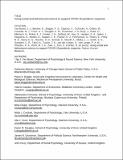| dc.contributor.author | Bavel, Jay J. Van | |
| dc.contributor.author | Baicker, Katherine | |
| dc.contributor.author | Boggio, Paulo S. | |
| dc.contributor.author | Capraro, Valerio | |
| dc.contributor.author | Cichocka, Aleksandra | |
| dc.contributor.author | Cikara, Mina | |
| dc.contributor.author | Crockett, Molly J. | |
| dc.contributor.author | Crum, Alia J. | |
| dc.contributor.author | Douglas, Karen M. | |
| dc.contributor.author | Druckman, James N. | |
| dc.contributor.author | Drury, John | |
| dc.contributor.author | Dube, Oeindrila | |
| dc.contributor.author | Ellemers, Naomi | |
| dc.contributor.author | Finkel, Eli J. | |
| dc.contributor.author | Fowler, James H. | |
| dc.contributor.author | Gelfand, Michele | |
| dc.contributor.author | Han, Shihui | |
| dc.contributor.author | Haslam, S. Alexander | |
| dc.contributor.author | Jetten, Jolanda | |
| dc.contributor.author | Kitayama, Shinobu | |
| dc.contributor.author | Mobbs, Dean | |
| dc.contributor.author | Napper, Lucy E. | |
| dc.contributor.author | Packer, Dominic J. | |
| dc.contributor.author | Pennycook, Gordon | |
| dc.contributor.author | Peters, Ellen | |
| dc.contributor.author | Petty, Richard E. | |
| dc.contributor.author | Rand, David G. | |
| dc.contributor.author | Reicher, Stephen D. | |
| dc.contributor.author | Schnall, Simone | |
| dc.contributor.author | Shariff, Azim | |
| dc.contributor.author | Skitka, Linda J. | |
| dc.contributor.author | Smith, Sandra Susan | |
| dc.contributor.author | Sunstein, Cass R. | |
| dc.contributor.author | Tabri, Nassim | |
| dc.contributor.author | Tucker, Joshua A. | |
| dc.contributor.author | Linden, Sander van der | |
| dc.contributor.author | Lange, Paul van | |
| dc.contributor.author | Weeden, Kim A. | |
| dc.contributor.author | Wohl, Michael J. A. | |
| dc.contributor.author | Zaki, Jamil | |
| dc.contributor.author | Zion, Sean R. | |
| dc.contributor.author | Willer, Robb | |
| dc.date.accessioned | 2020-05-06T14:45:46Z | |
| dc.date.available | 2020-05-06T14:45:46Z | |
| dc.date.issued | 2020-04 | |
| dc.identifier.issn | 2397-3374 | |
| dc.identifier.uri | https://hdl.handle.net/1721.1/125045 | |
| dc.description.abstract | The COVID-19 pandemic represents a massive global health crisis. Because the crisis requires large-scale behaviour change and places significant psychological burdens on individuals, insights from the social and behavioural sciences can be used to help align human behaviour with the recommendations of epidemiologists and public health experts. Here we discuss evidence from a selection of research topics relevant to pandemics, including work on navigating threats, social and cultural influences on behaviour, science communication, moral decision-making, leadership, and stress and coping. In each section, we note the nature and quality of prior research, including uncertainty and unsettled issues. We identify several insights for effective response to the COVID-19 pandemic and highlight important gaps researchers should move quickly to fill in the coming weeks and months. | en_US |
| dc.publisher | Springer Science and Business Media LLC | en_US |
| dc.relation.isversionof | http://dx.doi.org/10.1038/s41562-020-0884-z | en_US |
| dc.rights | Creative Commons Attribution-Noncommercial-Share Alike | en_US |
| dc.rights.uri | http://creativecommons.org/licenses/by-nc-sa/4.0/ | en_US |
| dc.source | Other repository | en_US |
| dc.title | Using social and behavioural science to support COVID-19 pandemic response | en_US |
| dc.type | Article | en_US |
| dc.identifier.citation | Van Bavel, Jay J. et al. "Using social and behavioural science to support COVID-19 pandemic response." Nature Human Behavior (April 2020) https://doi.org/10.1038/s41562-020-0884-z © 2020 Springer Nature Limited | en_US |
| dc.contributor.department | Sloan School of Management | en_US |
| dc.contributor.department | Massachusetts Institute of Technology. Department of Brain and Cognitive Sciences | en_US |
| dc.relation.journal | Nature Human Behavior | en_US |
| dc.eprint.version | Original manuscript | en_US |
| dc.type.uri | http://purl.org/eprint/type/JournalArticle | en_US |
| eprint.status | http://purl.org/eprint/status/NonPeerReviewed | en_US |
| dspace.date.submission | 2020-05-05T17:38:43Z | |
| mit.license | OPEN_ACCESS_POLICY | |
| mit.metadata.status | Complete | |
